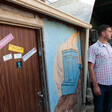The Electronic Intifada 12 December 2014

A Palestinian woman stands on the rubble of her home in the Jerusalem neighborhood of Issawiyeh on 1 December. The building was destroyed by the municipality on the pretext that it was built without a permit.
APA imagesThere is a political edge to the guided tours of Jerusalem that Daoud al-Ghoul gives.
Walking through its Old City, the 31-year-old takes visitors to meet residents whose water has been cut off by the Israeli-controlled local municipality or who have been beaten by soldiers and arrested. The Palestinians that his guests encounter are struggling to maintain a strong and vibrant community despite how Israeli settlers and the authorities want to remove them from their hometown altogether.
For the next few months, al-Ghoul’s tours will have to stop.
In early December, he and four other activists — Majd Darwish, Saleh Dirbas, Akram Shurafah and Faris Abu Ghanam— were given Israeli military orders banning them from entering Jerusalem and returning home until 30 April next year. The men were not given any reason for the bans.
All five men were born in Jerusalem and have previously been imprisoned by Israel. On 9 December — six days after the original bans were issued — al-Ghoul received a second deportation order, this time from an Israeli military court in the occupied West Bank.
The second order excludes him from the West Bank in its entirety.
Al-Ghoul is a youth coordinator of the Health Work Committees, a Palestinian organization providing medical services.
The orders put him in an extremely difficult position: if he leaves Palestine, there is no guarantee that the Israeli authorities will allow him to return. If he stays put, he risks being jailed again.
Defiant
Speaking to The Electronic Intifada, he sounded a defiant note. “We will not give up,” he said. “We are not afraid. We are fighting for our future and we have nothing to lose. We refuse this decision. It is our homeland. It is our basic right to live in our houses in Jerusalem.”
Israel’s military orders violate international law. The Fourth Geneva Convention of 1949 forbids an occupying power from deporting people under occupation.
Al-Ghoul is from Silwan, a part of Jerusalem close to the Old City. He has lived in Jerusalem all his life. The Israeli occupation nonetheless treats him as a “permanent resident,” rather than as a citizen of the city.
He is required to regularly prove that his “center of life” is in Jerusalem. Such bureaucratic stipulations severely limit what Palestinians can do. If they are to marry someone living outside Jerusalem or to study abroad, they risk having their residency rights withdrawn.
Between 1967 and 2010, Israel revoked the residency of more than 14,000 Palestinians in Jerusalem, according to the United Nations monitoring group OCHA.
Ethnic cleansing inch by inch
The ethnic cleansing of Jerusalem takes a variety of other forms.
In most of the West Bank, Israel is actively confiscating land and building settlements. Yet in Jerusalem this process is being done house by house, inch by inch.
More than 35 percent of the land in occupied East Jerusalem has been earmarked for the expansion and construction of settlements, according to OCHA.
Settlers often take over Palestinian houses, displacing families and fragmenting communities. The settlers are usually accompanied by armed security.
Palestinians, on the other hand, are routinely denied permits to build new homes or extensions to existing ones. More than 2,000 Palestinian homes have been demolished in East Jerusalem since 1967, according to OCHA.
The Israeli-controlled Jerusalem municipality claims that the reason for demolition is because the houses were built without permits. However, the process for Palestinians to apply for permits is a Kafkaesque maze which often ends in denial after the family has spent around $25,000.
Only five percent of Palestinians who apply for permits to build actually receive them, according to the Israeli Committee Against House Demolitions. Meanwhile, the Israeli government rubber-stamps approval for construction of new settlements.
It has been an especially repressive year. Since June, Israel has detained at least 1,300 Palestinians from Jerusalem alone, says the Palestinian Prisoners Club.
Daoud al-Ghoul can trace back his family’s roots in Jerusalem by four centuries. Yet that hasn’t stopped Israel from denying him the right to live and work in his hometown — just as it has done with thousands of others.
Rachelle Friesen spent four years working in Jerusalem with an international aid organization. In May 2014, Israel deported her. She now lives in Canada.



